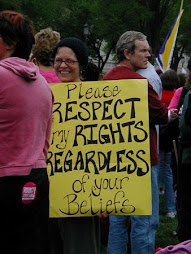Weber’s work is feminist to the core. It is also holistic, stressing the interconnectedness of all life. She is part sociologist, part historian, part anthropologist, part psychologist and part philosopher as she examines the physical, emotional, mental and spiritual impact of crisis pregnancy in women’s lives. She urges us to reproduce consciously. I appreciate the use of the word “conscious” when it comes to reproduction and everything it implies. While Weber always remembers that humans are part of nature, she also stresses that we are sentient and conscious beings, and able to make choices about the direction of our lives. Without abortion, conscious reproduction is not possible. As Weber says, “We are not free if we do not have reproductive freedom.” (p. xvii)
In considering the barriers to free choice, Weber offers a combination of old school consciousness raising along with what feels like an introductory Women’s Studies course. She presents a primer on patriarchy. She describes mothering mythologies and how women have learned to subordinate our true desires within patriarchy, referring to feminist thinkers like Adrienne Rich and Carol Gilligan, among others. But she also refers to women she has come into contact with in her practice, giving them equal authority. She writes that choice is difficult. We sometimes fall back on our learned subordinate roles and allow others to make choices for us. As women, we sometimes do not know how to make our own decisions based on our own needs or are unaccustomed to making our own decisions. We have learned to be subservient, to place the needs of others before our own, to adopt the values of social institutions like churches and not to think for ourselves. She writes, “It is nothing short of revolutionary for a woman to define her own morality.” (p. 58)
Some women will balk at this description of themselves in patriarchy and refuse to believe they are subject to forces beyond their control. No one likes to be painted as powerless or under the control of forces they don’t consciously understand. I’ve seen women utterly reject this notion in Women’s Studies classes. But if this is your reaction, I urge you to keep reading. Often, we can’t see the box we are in until someone makes us feel the edges of it. Yet, there is no place in this work for seeing women as victims. There is only opportunity for growth. A crisis pregnancy can teach women about their own true desires and to act in their own best interests, to know themselves and to take conscious control of their lives. Whatever choices are made, there is no blame or judgement. Weber writes, “Women make choices within the context of a society that is hostile to our choice making. Pressures come from within and without. We make our choices within the limits of our awareness. We do the best we can.” (p. 39)
Weber speaks of women who have positive experiences with abortion and who feel empowered by this opportunity to make a choice that is best for them. She reminds us that taking care of oneself is not selfish, and I think at this point in women’s social history we cannot be reminded of this frequently enough. She also considers stories of women who struggle with the termination of their pregnancy. Yet, she never falls into the trap of blaming abortion itself for trauma, as many anti-choice people do. She writes, “Women need to be careful not to mimic the culture by using the abortion experience as a convenient dumping ground for feelings about other unresolved aspects of our lives.” (p. 55) Further, she writes, “To find causes for these feelings we must develop a broader, deeper perspective about life as a woman in patriarchal society.” (p. 55)
Weber explains all of this in a tone that mirrors the curiosity and compassion she asks of her readers. Crises involving sex and death bring us face to face with our place in creation. Death is a vital and necessary part of life, yet our culture does not encourage us to think about death. Weber asks us not to shy away from the fact that abortion is a kind of death and to understand that death serves life. She challenges pro-choice people to engage in discussions, even when words like death and killing are used and not to deny that abortion can include feelings of loss and grief. To do better, we must know better. We must learn. Weber teaches by offering us the stories of women she has counselled and her own experiences. She extends her observations about these stories into an explanation of the social, political, historical and cultural context of our collective lives. In this way, she is able to illustrate how the personal is political. In this approach, you can see her roots in second wave feminism. Her work is a reminder of how powerful consciousness-raising can be as a tool for change.
Sometimes I wish she delved a little further into the existing research and offered a few more footnotes. For example, she writes, “Scarcity of social support is the most significant contributor to psychological distress and confusion around abortion, especially in relation to morality and spirituality.” (p. 15) I agree, but feel she misses an opportunity here to cite studies and provide the reader with something beyond her (admittedly vast) personal experience that we could use to support this point of view.
The book isn’t linear; she loops back to ideas, repeats them, adds to them. You have to read to the end to see her whole point or you risk categorizing her ideas wrongly. I have to admit that Weber nudges up against places that bother me. But, I kept reading with curiosity, as she advised. She is a bit new-agey for me. I imagine that this part of her thinking, as unappealing as it is to me, will appeal to others. At one point, she questions the importance of championing individual rights. I understand that in her holistic world view, rights can only be understood in relationship, but in the world the way it is now, I think we have to remain vigilant about respecting the rights of individuals. Finally, she calls her perspective “pro-life.” I understand why she does this. Anti-choice people have taken up this moniker when they are really only pro-fetal-life. It is important to make this point. Re-branding is necessary, but I think it would be better to find a new term. Otherwise, as she admits, we risk blurring the lines between those who want to ensure women can make conscious choices about reproduction and those who would do anything to remove those choices.
In another case, she does find the new term we need. She dismisses “family planning” as a descriptor because people are not necessarily planning for families when they seek birth control methods and information. She says what they are doing is “sexual planning,” and she is right. We could all adjust our language here and better describe our work. This is one of many little gems scattered throughout the book and easily missed on too quick a read.
Weber’s final thoughts on how the dynamics of personal and political power will have to change in order for women to safely and peacefully determine what she calls “the flow of life” through pregnancy is inspired and hopeful. Life Choices is a thoughtful and provocative addition to the wider literature on abortion and has the potential to help many women (and men) come to a better understanding of the important place abortion has in our lives.
*****
This review is part of a blog tour I was asked to participate in by Linda Weber’s publisher, Sentient Publications, who provided me with a review copy. I have not been paid for this review and the views expressed are my own. In fact, I would have blogged about the book anyway (though probably a little less formally) because I think it’s an important addition to the very scant literature on abortion. The next blog on the tour is at Women's Glib on November 19 and the previous blog on the tour was at Anti-choice is Anti-Awesome. Linda Weber will be doing an actual physical tour of the west coast in February. Please consult her website for more details closer to that date.
The Abortion Monologues is available for purchase at www.abortionmonologues.com and available as an e-book on Smashwords. Check it out.
The Abortion Monologues is available for purchase at www.abortionmonologues.com and available as an e-book on Smashwords. Check it out.



